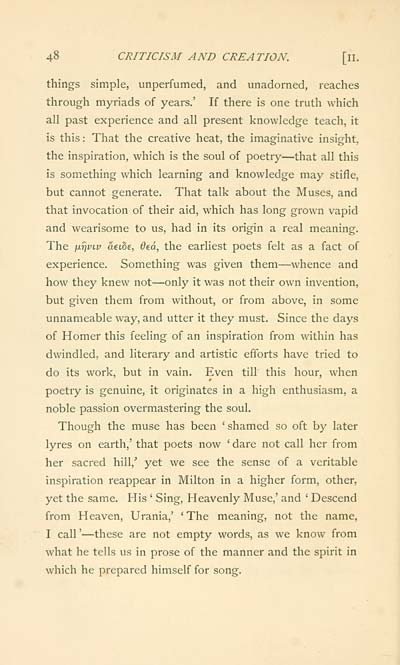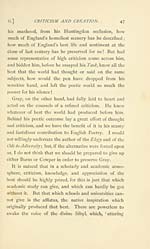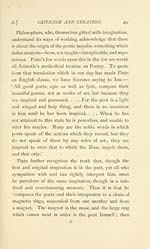Download files
Complete book:
Individual page:
Thumbnail gallery: Grid view | List view

48 CRITICISM AND CREATION. [ll.
things simple, unperfumed, and unadorned, reaches
through myriads of years.' If there is one truth which
all past experience and all present knowledge teach, it
is this : That the creative heat, the imaginative insight,
the inspiration, which is the soul of poetry — that all this
is something which learning and knowledge may stifle,
but cannot generate. That talk about the Muses, and
that invocation of their aid, which has long grown vapid
and wearisome to us, had in its origin a real meaning.
The \xr\viv aeibe, Bed, the earliest poets felt as a fact of
experience. Something was given them — whence and
how they knew not — only it was not their own invention,
but given them from without, or from above, in some
unnameable way, and utter it they must. Since the days
of Homer this feeling of an inspiration from within has
dwindled, and literary and artistic efforts have tried to
do its work, but in vain. Even till this hour, when
poetry is genuine, it originates in a high enthusiasm, a
noble passion overmastering the soul.
Though the muse has been 'shamed so oft by later
lyres on earth,' that poets now ' dare not call her from
her sacred hill,'' yet we see the sense of a veritable
inspiration reappear in Milton in a higher form, other,
yet the same. His ' Sing, Heavenly Muse,' and ' Descend
from Heaven, Urania,' 'The meaning, not the name,
I call ' — these are not empty words, as we know from
what he tells us in prose of the manner and the spirit in
which he prepared himself for song.
things simple, unperfumed, and unadorned, reaches
through myriads of years.' If there is one truth which
all past experience and all present knowledge teach, it
is this : That the creative heat, the imaginative insight,
the inspiration, which is the soul of poetry — that all this
is something which learning and knowledge may stifle,
but cannot generate. That talk about the Muses, and
that invocation of their aid, which has long grown vapid
and wearisome to us, had in its origin a real meaning.
The \xr\viv aeibe, Bed, the earliest poets felt as a fact of
experience. Something was given them — whence and
how they knew not — only it was not their own invention,
but given them from without, or from above, in some
unnameable way, and utter it they must. Since the days
of Homer this feeling of an inspiration from within has
dwindled, and literary and artistic efforts have tried to
do its work, but in vain. Even till this hour, when
poetry is genuine, it originates in a high enthusiasm, a
noble passion overmastering the soul.
Though the muse has been 'shamed so oft by later
lyres on earth,' that poets now ' dare not call her from
her sacred hill,'' yet we see the sense of a veritable
inspiration reappear in Milton in a higher form, other,
yet the same. His ' Sing, Heavenly Muse,' and ' Descend
from Heaven, Urania,' 'The meaning, not the name,
I call ' — these are not empty words, as we know from
what he tells us in prose of the manner and the spirit in
which he prepared himself for song.
Set display mode to: Large image | Transcription
Images and transcriptions on this page, including medium image downloads, may be used under the Creative Commons Attribution 4.0 International Licence unless otherwise stated. ![]()
| Early Gaelic Book Collections > Ossian Collection > Aspects of poetry > (64) |
|---|
| Permanent URL | https://digital.nls.uk/78386040 |
|---|
| Description | Selected books from the Ossian Collection of 327 volumes, originally assembled by J. Norman Methven of Perth. Different editions and translations of James MacPherson's epic poem 'Ossian', some with a map of the 'Kingdom of Connor'. Also secondary material relating to Ossianic poetry and the Ossian controversy. |
|---|
| Description | Selected items from five 'Special and Named Printed Collections'. Includes books in Gaelic and other Celtic languages, works about the Gaels, their languages, literature, culture and history. |
|---|

